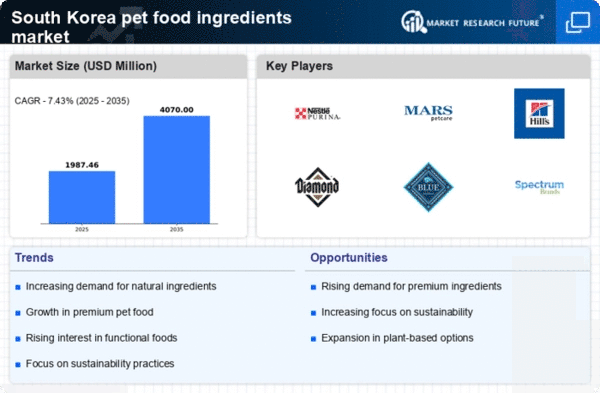The competitive dynamics within the pet food-ingredients market in South Korea reflect a landscape characterized by innovation and strategic partnerships. Key growth drivers include the increasing demand for premium pet food products, driven by rising pet ownership and consumer awareness regarding pet nutrition. Major players such as Nestle Purina Petcare (US), Mars Petcare (US), and Royal Canin (FR) are actively shaping the market through their focus on product innovation and sustainability initiatives. Nestle Purina Petcare (US) emphasizes the development of high-quality, nutritionally balanced products, while Mars Petcare (US) leverages its extensive distribution network to enhance market penetration. Royal Canin (FR) positions itself as a leader in veterinary diets, catering to specific health needs, which collectively influences the competitive environment by fostering a culture of continuous improvement and responsiveness to consumer preferences.
Key business tactics employed by these companies include localizing manufacturing and optimizing supply chains to enhance efficiency and reduce costs. The market structure appears moderately fragmented, with a mix of established brands and emerging players. This fragmentation allows for diverse product offerings, yet the collective influence of key players like Blue Buffalo (US) and WellPet (US) is significant, as they drive trends in natural and organic ingredients, further intensifying competition.
In October 2025, Mars Petcare (US) announced a strategic partnership with a local South Korean startup focused on developing plant-based protein sources for pet food. This collaboration aims to enhance Mars's product portfolio while addressing the growing consumer demand for sustainable and environmentally friendly options. The strategic importance of this partnership lies in its potential to position Mars as a frontrunner in the plant-based segment, aligning with global trends towards sustainability.
In September 2025, Nestle Purina Petcare (US) launched a new line of functional pet foods designed to support specific health conditions, such as joint health and digestive wellness. This initiative reflects the company's commitment to innovation and meeting the evolving needs of pet owners. By focusing on health-oriented products, Nestle Purina Petcare (US) not only strengthens its market position but also responds to the increasing consumer preference for functional pet foods.
In August 2025, Royal Canin (FR) expanded its distribution network in South Korea by partnering with local veterinary clinics to promote its specialized diets. This strategic move enhances Royal Canin's visibility and accessibility, allowing it to better serve pet owners seeking tailored nutritional solutions. The importance of this expansion lies in its ability to foster trust and credibility among consumers, as veterinary recommendations play a crucial role in pet food purchasing decisions.
As of November 2025, current trends in the pet food-ingredients market are increasingly defined by digitalization, sustainability, and the integration of artificial intelligence in product development. Strategic alliances are shaping the landscape, enabling companies to leverage shared expertise and resources. Looking ahead, competitive differentiation is likely to evolve from traditional price-based competition towards a focus on innovation, technology, and supply chain reliability. This shift suggests that companies will need to invest in research and development to create unique offerings that resonate with health-conscious consumers.

















Leave a Comment